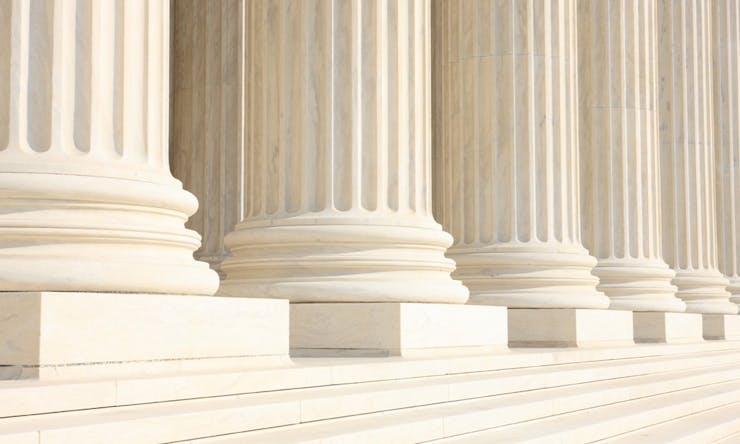Rolland Gregg and his family have fought federal cannabis charges for more than three years, arguing that the roughly 70 plants investigators found on their property in Washington state were for their own medicinal use and fully complied with state law.
A federal jury last year convicted Gregg, his mother, and his then-wife of growing 50 to 100 marijuana plants — amounts their attorney said are in compliance with state medical marijuana law. With prison sentences looming, they’re fighting back by pointing to a recent act of Congress—the Rohrabacher-Farr Amendment—that they say should have prevented the U.S. Department of Justice from prosecuting them.
The U.S. Department of Justice disagrees with Gregg's interpretation of the law.
"It's been the hardest thing I've ever had to deal with in my life when you see the government coming down on you for simply trying to be healthy," Gregg said.

Rolland Gregg
The 9th Circuit Court of appeals, which has jurisdiction over nine western states, is expected to issue a ruling soon on the scope of the Rohrabacher-Farr Amendment and whether it applies to cases like Gregg’s. That ruling could end or overturn at least six federal cannabis criminal prosecutions and convictions in California and Washington, including Gregg's. It could also limit future prosecutions of medical marijuana users and dispensaries in eight western states that allow them. (Idaho is the only state within the 9th Circuit that doesn’t.)
"The 9th Circuit is the biggest circuit, one that contains lots of marijuana states. If they were to say, 'The federal government is prohibited from enforcing medical marijuana law,' that would be huge," said Sam Kamin, a professor at the University of Denver Sturm College of Law who studies cannabis regulation.
At issue is a Congressional amendment that said the DOJ could not use Congressionally-allocated funding to prevent states that have legalized medical marijuana from implementing laws that permit its use, distribution and possession.
The amendment's bipartisan sponsors — California Congressmen Sam Farr, D-Carmel, and Dana Rohrabacher, R-Costa Mesa,— say it prohibits the DOJ from prosecuting people who are complying with state medical marijuana laws.
California and more than 20 other states have legalized cannabis for medical use. The drug, however, remains illegal under federal law.
The DOJ has interpreted the law more narrowly, claiming it prevents prosecutors from trying to block state medical cannabis laws or charging state officials who implement them, but permits U.S. attorneys to go after cannabis dispensaries and growers.
Shop highly rated dispensaries near you
Showing you dispensaries nearThe 9th Circuit is expected to clarify the amendment in appeals by three sets of defendants, who have cited it as grounds for judges to dismiss their cannabis charges.
Steve McIntosh, a dispensary owner in Los Angeles, had permits from local officials that show him in compliance with state law, according to his attorney, Marc Zilversmit. Under the Congressional amendment, the most the federal government can do is refer him to state authorities for prosecution, Zilversmit said.
Another defendant, cannabis farmer Samuel Doyle, met Washington State's requirements for collective cannabis grows for medical marijuana patients, his attorney Douglas Hiatt said. "He was growing medical marijuana for people who needed it, whether they could afford it or not," Hiatt said.
DOJ officials claim McIntosh's dispensary had ties to a street gang, and Doyle and his co-defendants didn’t meet the legal requirements for medical marijuana in Washington State. Investigators found more than 550 plants growing on the Spokane property Doyle oversaw, and at least one of Doyle's co-defendants indicated the cannabis was being sold, prosecutors said.
The DOJ did not respond to a request for further comment.
Gregg's case is not among the ones the 9th Circuit is set to rule on. But he has raised the same argument as the other defendants, and the 9th Circuit has put his appeal on hold pending the outcome of the other appeals, his attorney Phil Telfeyan said.
"The feds think they have the power to override voters of the State of Washington and the will of Congress," said Telfeyan, co-founder of the nonprofit civil rights group Equal Justice Under Law. "It's up to the 9th Circuit to tell them, 'Enough is enough. You can't keep prosecuting people who are using medical marijuana for their needs.'"
The DOJ cited a county investigator's testimony that he saw evidence of a for-profit cannabis farming operation on Gregg's family property. The investigator said he found records that he believed were for drug sales, a scale and packaging material in the house as well as firearms, according to court documents.
Gregg, 34, who owns an alternative energy company, denied he sold cannabis, saying he used the drug to treat pain following a snowboarding accident that left him with a broken back and neck. His mother has rheumatoid arthritis and his then-wife had an eating disorder, he said, adding that all three had medical marijuana authorizations.
But the DOJ argued in his case, and Doyle and McIntosh's cases, that the Rohrabacher-Farr amendment doesn't bar the federal agency from prosecuting people violating federal drug law, even if they meet state law.
Alex Kreit, a cannabis law expert at Thomas Jefferson School of Law in San Diego, said the DOJ and cannabis defendants each have strong arguments for their conflicting interpretations of the amendment.
"The (amendment's) language is not a model of clarity," he said. "It really is open to a number of different interpretations."
Image Source: AP









